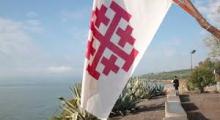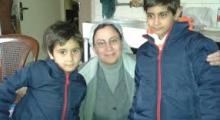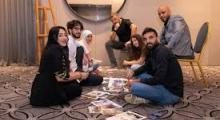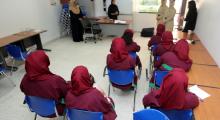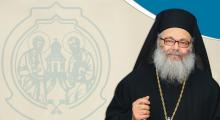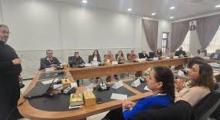Issued by the Catholic Center for Studies and Media - Jordan. Editor-in-chief Fr. Rif'at Bader - موقع أبونا abouna.org
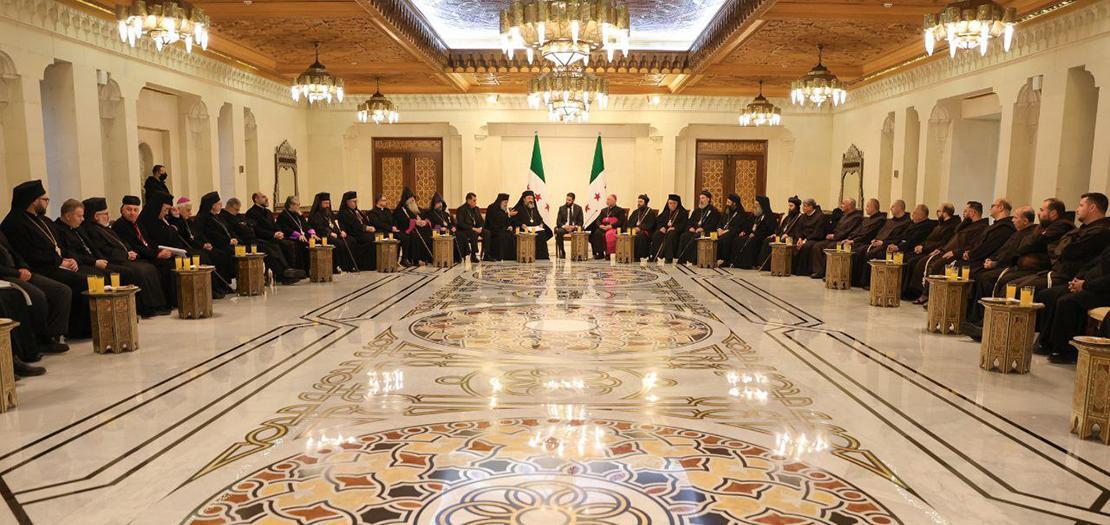
On 31 December 204, a delegation including Catholic bishops and Franciscan friars from the Custody of the Holy Land met Abu Mohammed al-Jolani at the presidential palace in Damascus.
Church leaders have “a sense of hope for Syria’s future”, the apostolic nuncio said, after the Patriarchs and Heads of Churches in Syria released a historic joint statement from Damascus and met the leadership of the new government.
“At this historic moment, as Syria undergoes a new transition, we address the public with a message of love and hope,” said the statement published on 29 December, setting out the role of Christians in fostering national reconciliation, advocating for economic relief, contributing to constitutional reform, and maintaining hope.
The leaders called for “a comprehensive national dialogue” to rebuild social cohesion and strengthen Syria’s identity as a diverse and inclusive nation. The statement also appealled to the international community to lift the economic sanctions imposed on Syria. “These sanctions have negatively impacted Syrian citizens from all spectrums,” they said.
A few days earlier, Patriarch John X of Antioch and All the East of the Greek Orthodox Church received the envoy of the new government of Syria, Dr Abu Omar, at the patriarchal residence in Damascus. Dr Omar brought the patriarch greetings from Ahmad Al-Sharaa, known as Abu Mohammed al-Jolani, head of the Islamist group Hay’at Tahrir al-Sham (HTS) and the rebel coalition that toppled President Bashar al-Assad’s regime last month.
The meeting discussed the position of Christians as indigenous citizens in Syria and emphasised their role in building the future together with all parts of Syrian society. This would include participation in drafting a new democratic constitution for the country.
On 31 December, two days after the Church leaders’ statement, a group including Syrian Catholic bishops and Franciscan friars from the Custody of the Holy Land met al-Jolani at the presidential palace in Damascus, reportedly receiving assurances that HTS and its allies would respect Christians.
“This event would have been unimaginable only three weeks ago,” said Cardinal Mario Zenari, the apostolic nuncio to Syria, who himself met the new government’s foreign minister Asaad Hassan al-Shaibani last week.
“At the leadership level, there is an understanding of some fundamental principles and values,” the cardinal told Vatican News. “However, it remains to be seen if words will translate into actions.”
Describing the moment as a “breach of hope”, Zenari said Christians should welcome it. “Christians have been given the opportunity – at least in words – to take part in rebuilding the new Syria, promoting values such as human rights, freedom, and respect for all. It is vital to be present and active in this reconstruction,” he said.
Last week, the Ecumenical Patriarch of Constantinople Bartholemew met Turkey’s President Recep Tayyip Erdoğan to urge him to employ his influence with the new regime to protect Christians and other minorities in Syria.
Observers reported cautious optimism at the first Christmas services since the fall of Assad. In Sednaya, north of Damascus, which houses both an ancient monastery and an infamous regime prison in which tens of thousands were tortured and executed, a large crowd gathered to witness the illumination of a large Christmas tree on Christmas Eve.
“This year is different, there’s happiness, victory and a new birth for Syria and a new birth for Christ,” said Houssam Saadeh, who attended the celebration outside the Greek Orthodox Patriarchal Monastery of Our Lady of Sednaya. Many in the crowd wore festive hats, while a band played music and others watched the event and its fireworks from nearby rooftops.
In the Church of Our Lady of Damascus in the capital, a large congregation gathered for Christmas liturgies shortly after a hundreds-strong protest against anti-Christian sentiment following the burning of a Christmas tree by a crowd in central Syria.
Approximately 1.5 million Christians were estimated to live in Syria in 2011, though in 2022 that figure fell to about 300,000 due to persecution and the effects of the Syrian Civil War.
After Pope Francis prayed on Christmas Day for Syrian Christians facing uncertainty, the head of the Chaldean Catholic Church in neighbouring Iraq said the region was “tense”.
Cardinal Louis Raphaël Sako, the Chaldean Patriarch of Babylon, told Vatican News that “the leaders of the armed opposition that have taken control of the country talk about a civil regime, of a new Syria respectful of human rights and of a government that will see the participation of all political and social components”, adding: “Let us hope they are sincere.”
As many as 100,000 Christians were driven out of Iraq when the Islamic State group seized control of large parts of the country in 2014, but Cardinal Sako said about 60 per cent of Christians had returned to Iraq since the Islamic State was defeated in 2017. “Interreligious ties are very much alive” in Iraq, he said.


